Mulching is beneficial to your grass for a variety of reasons, and it should be done on a regular basis. Mulching is an excellent soil amendment that reduces your lawn’s fertilizer requirements and replenishes critical minerals that would otherwise be lost. In this article, find out why does mulch smell bad.
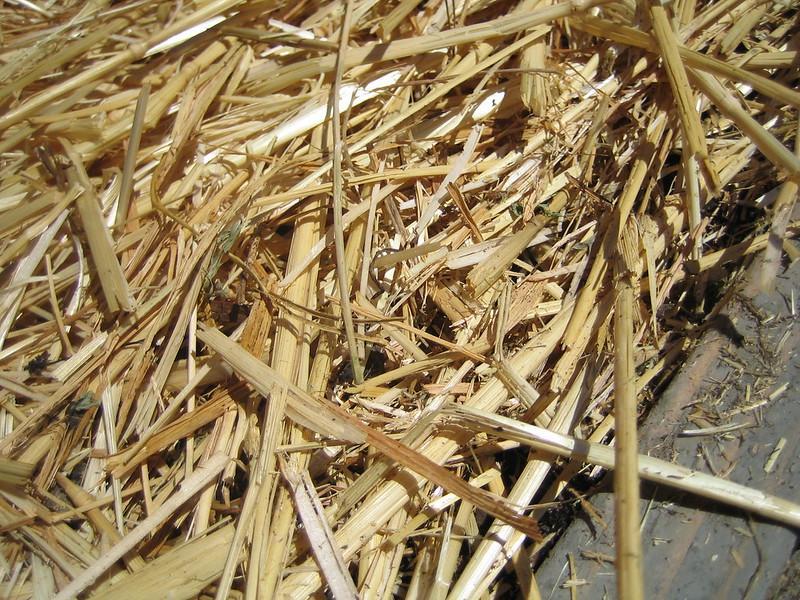
Any gardener is aware that mulch is a very convenient tool. I myself use it to help maintain moisture levels in the garden and to overwinter my strawberries. However, if mulch is so great, why does it occasionally smell so bad?
The presence of a rotten smell in mulch is often indicative of the accumulation of toxic compounds that arise from anaerobic decay. It is brought on by a combination of factors, including low oxygen levels, compaction, and wet conditions.
Following anaerobic decay, odorous byproducts such as methanol, acetic acid, or hydrogen sulfide buildup which cause the mulch to stink. Providing your mulch a little air by thinning and mixing it before applying will reduce the stink.
However, smelly odors can also be caused by dyes and spontaneous decomposition in addition to anaerobic conditions. Read on to learn more!
What Is Mulch Supposed To Smell Like?
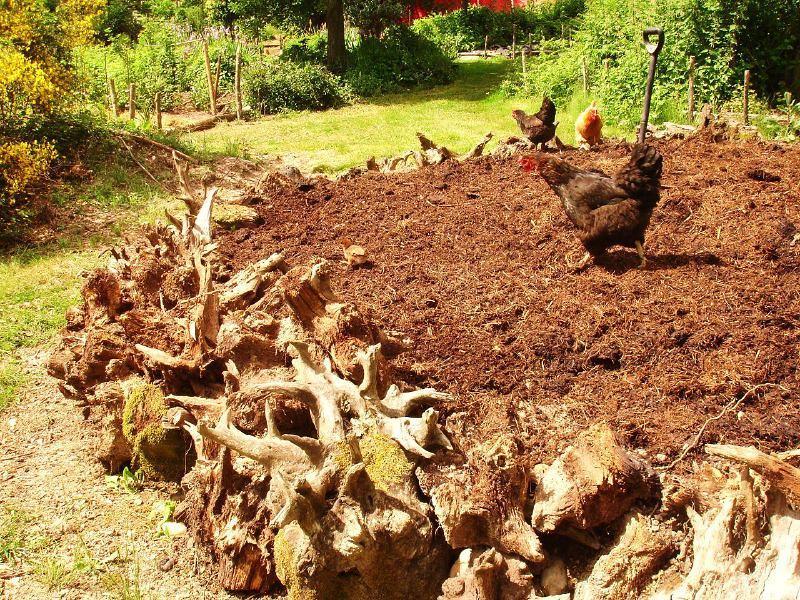
Given its composition, a good mulch should have a woody or sawdusty aroma or perhaps of fresh compost.
The aroma of mulch is something that appeals to a lot of individuals. To determine whether or not the mulch you are using has an offensive odor, you must first be familiar with the typical aroma of mulch. If the scent of your mulch is greater than that of regular compost and is so offensive that it bothers you, then it may have gone bad!
A quality mulch will have the smell of recently turned compost. Or, more typically, the scent of sawdust or lumber that has recently been cut. It is possible to identify the quality of mulch by sniffing it; if it smells pleasant, it is good to use on your plants or grass; on the other hand, if it stinks, it is most likely gone bad.
So, if your mulch has a sour or decaying stench, consider it a red signal. This sour smell, similar to that of vinegar, is an indicator of the presence of acetic acid. Acetic acid is never going to be beneficial for the plants or grass you have. In fact, it is used in weed and vegetation killers—Click here to learn more about it.
The use of toxic mulch might be detrimental to the health of your plants and grass. In addition, it can harm the foliage by causing yellow/scorched spots on the leaves.
All in all, mulch, as a whole, does not give out very pungent odors. Mulch that is normal and healthy should just smell light and organic.
RELATED: Bring Prosperity And Glory To Your Garden With Cedar Mulch
Why Does Some Mulch Smell Bad?
Mulch smells bad when it is starved of oxygen. For example, the bacteria that decompose mulch will produce methane gas if kept in airtight sacks or piled up in huge loads and not ventilated. A damp area with limited air circulation retains this gas, resulting in a strong manure odor. However, this is only one of the many reasons why mulch could have an unpleasant odor. Continue reading to find out about the other possible causes!
Black Rubber & Colored Mulch That Smells Bad
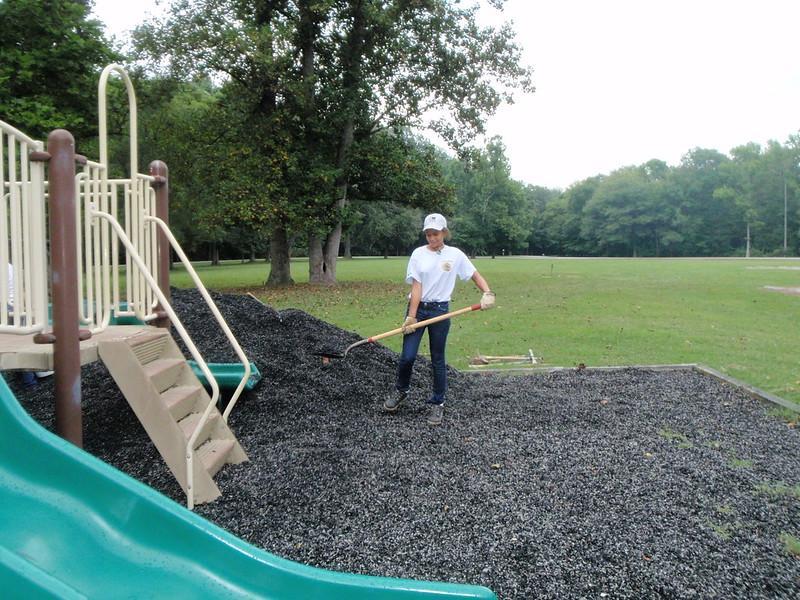
Rubber mulch is created with recycled rubber, most frequently tire-waste crumb rubber.
The presence of anaerobic conditions is typically to blame for unpleasant-smelling mulch; however, colored mulch is another common cause of the issue. While colored mulch is not detrimental to plants or grass, it is much more stinky, so keep that in mind while purchasing it. Many people purchase colored mulch for their gardens because they think it looks nicer and want their gardens to seem as pleasant and appealing.
In most cases, a substance known as red oxide is used to color the mulch; this substance smells similar to rust. The smell gets even more potent when temperatures rise. So, be careful when using this mulch, as it can make your lawn or garden smell bad on a hot day!
On the other hand, carbon dyes are what give mulch its dark color, and contrary to popular belief, mulch that has been black-dyed typically does not have an offensive odor.
Meanwhile, the smell of black rubber mulch can be somewhat overpowering. It smells like freshly aired-out sneakers or brand-new rubber tires. To make matters even more problematic, rubber mulch is devoid of any beneficial effects in terms of nutritional value. Thankfully, the smell will be gone within two or three days after the installation is complete.
But Wait!
The fact that the odor disappears, however, does not indicate that the issue has been resolved. Rubber releases chemicals over time, and those chemicals can leach into the soil, where they can be toxic to plant life.
RELATED: How To Get Rid Of Creeping Charlie From Your Lawn For Good!
Mulch That Smells Sour Like Vinegar
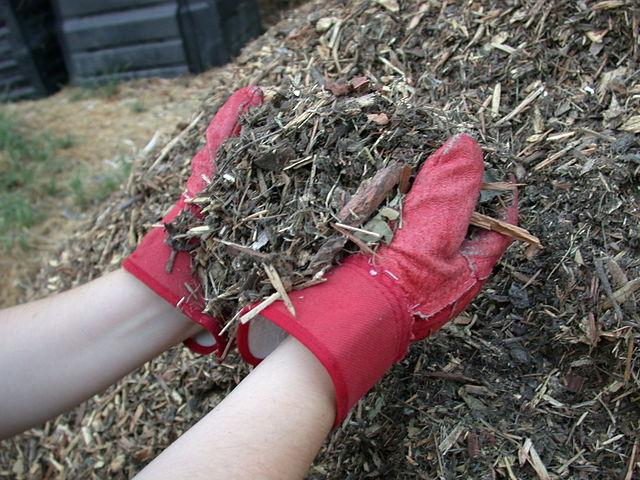
Mulch may occasionally begin to smell like sulfur or vinegar, which is a sign that it has fermented.
Sour mulch develops when the materials used to manufacture mulch are stored in excessively big mounds. Due to the large size of these piles, pockets of mulch around the pile’s center may develop anaerobic conditions.
When this occurs, microbes in the mulch produce byproducts such as acetic acid, ammonia gas, methanol, and hydrogen sulfide gas, giving the mulch its characteristic sour smell.
The pH of sour mulch can range anywhere from 5.6 all the way down to 1.8. The low pH and the presence of chemicals in the mulch can be detrimental to the health of plants.
If you surround your plants with sour mulch, they might wilt, their leaves might turn yellow, and in extreme cases, the leaves will fall off, and the plants might die. This will happen faster on warmer days when the gasses from the mulch are released more quickly.
Do a pH Test!
It is possible to tell whether or not mulch is sour by conducting a pH test; the pH of sour mulch ranges from 1.8 to 2.5, whereas the pH of mulch that has been composted correctly should be somewhat neutral. Overall, it is a good idea to inspect your mulch before putting it in your garden. If it stinks, you should fix it before giving it to your plants.
Mulch That Smells Due To Anaerobic Conditions
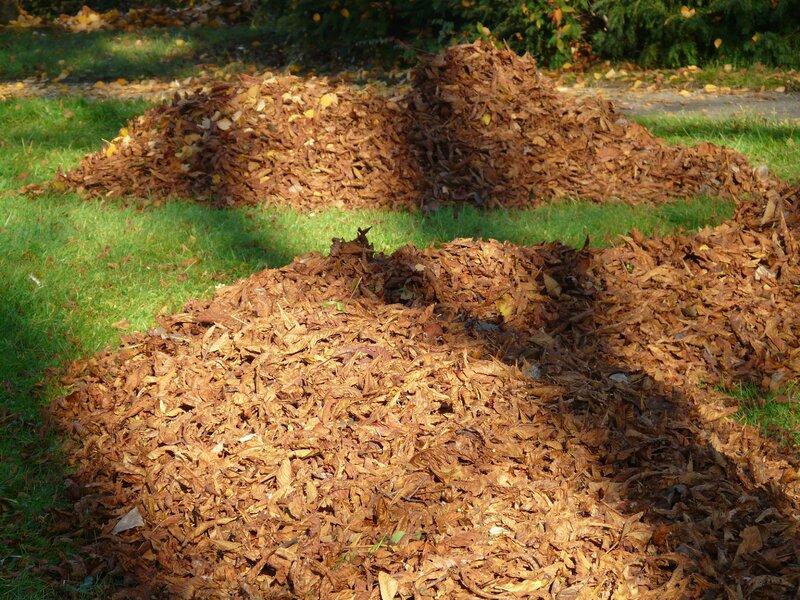
Never store large mulch mounds in places with little or no air circulation.
As I mentioned earlier, mulch will eventually break down into its component parts as time passes. However, this is contingent on the presence of something very important: oxygen. This decomposition is considered natural and healthy when it takes place under the appropriate circumstances.
However, the commercial production of organic mulch takes place on a huge scale, and how it is stored is frequently the root cause of the odor that is associated with it. After storing it in large stacks, they will put it in airtight bags, so it is ready to be shipped.
Thus, anaerobic conditions will persist until mulch gets to your home and you remove it from plastic bags. In the absence of oxygen, the breakdown of mulch results in the production of acetic acid or methane gas, all of which are released into the atmosphere and the soil. And this is what causes the mulch to have an odor similar to rotten eggs or manure!
The mulch you use in your garden can likewise have this issue. If it is all packed together tightly or thrown down in too thick of a layer, it can cause anaerobic conditions, leading to a foul odor of mulch.
RELATED: Pros And Cons of Using Straw To Cover Grass Seed In A Newly Seeded Lawn
Problems Caused By Bad Smelling Or Sour Mulch
Not only does sour and rotten mulch have an unpleasant odor, but it also has the potential to harm plants or grass on your lawn. This is because the additional chemicals produced while using sour mulch, including acetic acid, hydrogen sulfide, and methane gas, can eventually seep into the soil and, by extension, your plants.
Unfortunately, not much can be done after symptoms start to appear because the toxins have already penetrated the plant from the mulch. Heavy watering can occasionally be beneficial, neutralizing the toxic compounds and reviving the plant. But, even then, sour mulch frequently causes irreparable damage if not discovered in time.
The gasses that are released from sour mulch will do the most damage to young plants and plants that have recently begun to grow. Plants that grow low to the ground will also experience harm first since they are physically closer to the mulch, which is the source of these toxic gasses.
How Do I Make My Mulch Not Smell?
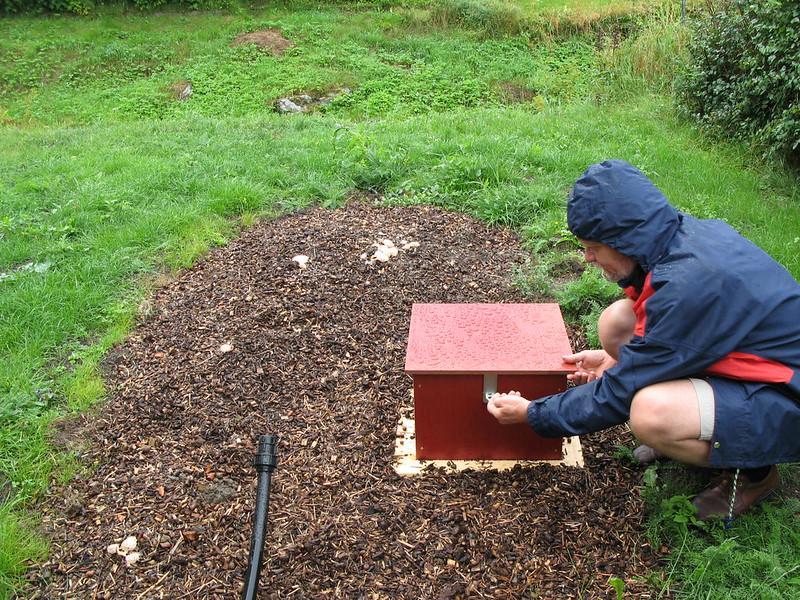
Ideally, you should give your mulch a good stir about once every month or so.
There isn’t much you can do if you have spread black rubber mulch on your lawn or yard. The foul stink should fade away on its own after a few days after mulch installation. Just make sure that it is not exposed to heat or direct sunlight.
As for organic mulches, the good news is that anaerobic conditions can be quickly corrected, and you do not have to throw away sour mulch. So, let’s go ahead and discuss a few ways you can avoid and fix your bad-smelling mulch!
Spread The Mulch In Open Air
Find a spot in your yard that is free of debris and gets a lot of sun. Spread the mulch out as thinly as possible, without stacking it up or compacting it in any way. Then just give it some breathing room and time to do its thing.
The decomposition of the mulch will resume, but this time in the presence of oxygen. The effects of the prior anaerobic circumstances ought to be neutralized in about three to five days after this has been done.
Fluff Up The Mulch
You should give your mulch a good stir about once every month or so. This is especially the case if the mulch is composed of a significant amount of organic matter.
Create growing spaces for indoor plants by poking holes through the mulch. This will improve the soil’s aeration by allowing air to enter the soil.
When spreading the mulch, you should aim for a thickness between two and four inches. If it is excessively thick, there is a good chance that it will collapse under its weight.
Avoid Storing Mulch In AIrtight Bags
Examine the mulch to check if it has sufficient air circulation. Airflow can be improved by fluffing the materials. This activity also contributes to the creation of additional air pockets inside your mulch. In storage, anaerobic decomposition can occur. Inadequate air circulation makes the condition even more severe, regardless of where it is stored.
Alternatively, you might puncture the packaging of the bagged mulch with a few small holes. Mulch can also be stored for an extended period of time by spreading it out over a tarp. However, it should be situated in a dry and well-ventilated area.
Wash The Mulch With Water
In addition, you can water the mulch as it is breaking down to assist in the process of washing away those pungent chemicals. This will get rid of the stench more quickly and help the mulch in breaking down in the best possible conditions.
Moving the mulch around every once in a while, commonly referred to as “turning” it, is another method that can be utilized to hasten the process.
What Is The Best Natural Mulch?
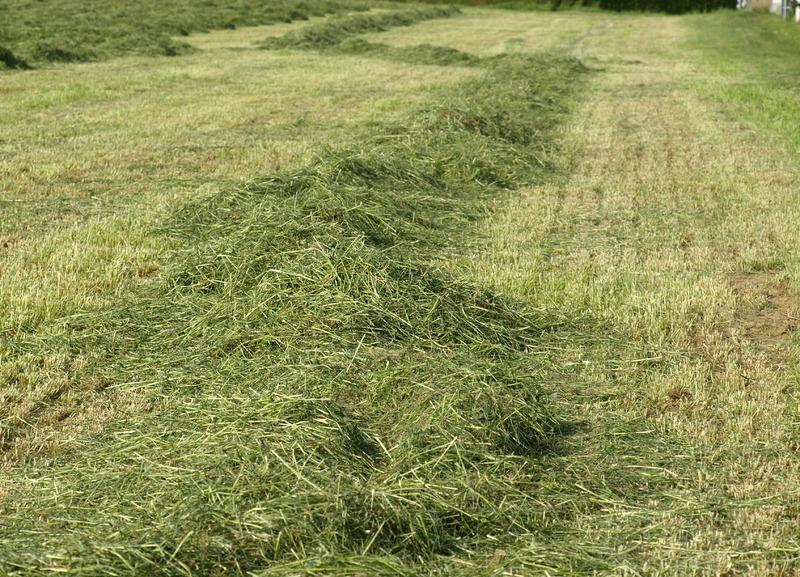
Fresh grass clippings contain a lot of nitrogen, which enriches the soil as it decomposes.
Your choice of mulch will be influenced by the plants you have in your yard or garden. If it’s going to be a garden, the landscaping plan will be just as significant. Luckily, there are a wide variety of natural mulches to choose from. Every type of mulch has its own distinct set of qualities, in addition to its own set of benefits and drawbacks.
Cypress Mulch
In appearance, cypress mulch resembles pine straw or needles. This mulch is typically very affordable. Additionally, the organic matter feeds the soil as it breaks down.
I believe that cypress mulch performs best when it comes to weed prevention. Sadly, valuable and old cypress groves are being destroyed to generate mulch.
Mini Pine Bark Chips
This mulch has a dark color that is perfect for landscaping. It does not wash away and remains in place. Pine bark chips also stop the soil from drying out during warm weather.
The mulch is ideal for potted plants since it prevents soil splashing while watering and gently breaks down to release essential nutrients.
Grass Clippings
In addition to limiting the sprouting of weeds, the addition of grass clippings to the soil ensures that it receives a suitable amount of nitrogen and potassium.
Additionally, grass clippings contribute to the overall fertility of the soil and discourage the presence of particular lawn and garden pests.
Pine Straw Mulch
Pine straw mulch assists in keeping the soil cool in the summer and warm in the winter, in addition to preserving moisture, avoiding erosion, and obstructing weed growth. Its tall structure traps air space, just like a blanket.
In regions with pine trees, you can find pine straw for free, and it costs little to buy it in sacks. There are many advantages to using pine straw mulch, including its ability to help plants thrive in acidic soil.
Final Thoughts
Mulch should have an earthy, pleasant scent similar to the material it was created from, such as straw or tree bark. Mulch only smells when it is stacked up and exposed to anaerobic conditions. Thus, it is preferable to remove extra mulch whenever needed!
Also, mulch that stinks can be fixed, so don’t toss it away. Give it plenty of air and water, and in three days, your garden will have mulch with a richer aroma. Other than that, avoid using synthetic mulches and go for organic mulches. I hope your garden is odor-free!
Frequently Asked Questions (FAQs)
Does all mulch smell like manure?
The mulch should have an earthy, earthy, and grassy scent. Mulch shouldn’t smell like manure since aromas associated with manure are caused by excess bacteria, fungi, and other pollutants that are not typical of mulch. Mulch smells like manure when it lacks oxygen. Therefore, if the mulch sits for more than a week, aerate it.
How long does it take for the mulch smell to go away?
The smell of new mulch typically lasts 3 to 14 days after the mulch is spread. However, sometimes it can take longer depending on the lawn, yard, or garden conditions. You can speed up this process by frequently watering and aerating your new mulch.
Can the smell of mulch make you sick?
Mulch that smells unpleasant, rotting, or like manure is not harmful to people or other animals. Although it may be unpleasant, the gasses that bacteria in your mulch release are not enough to be dangerous. However, a sour or foul-smelling mulch should not be put on grass or plants before treatment.
What happens when mulch gets wet?
Mulching in damp conditions or using wet mulch will be more challenging because it will be heavier, stick to your garden tools like shovels and rakes, and get you wet. Similarly, moisture gets locked in if mulch is put on moist soils.
How can you tell if mulch is bad?
Mulch that has gone bad will smell bad and sour like rotten eggs or vinegar. In fact, all types of mulch will eventually go bad and need to be replaced over time. However, adequate aeration can get rid of the hazardous mulch constituents in 24 hours to 3 days.
Sources For Further Reading
Mulching and Weed Management in the Urban Landscape – University of Massachusetts Amherst Extension Service
Mulching Trees and Shrubs – University of Maryland Extension Service
Benefits of Mulch – University of Nebraska Extension Service
Sheet Mulching: Lawn to Garden Bed in 3 Steps – The Pennsylvania State University Extension Service
Editor’s Recommendations
Why Is My St. Augustine Grass Turning Yellow | Possible Causes & Easy Fixes
Can I Mow Right After Aerating? | Mistakes That You Should Avoid!







